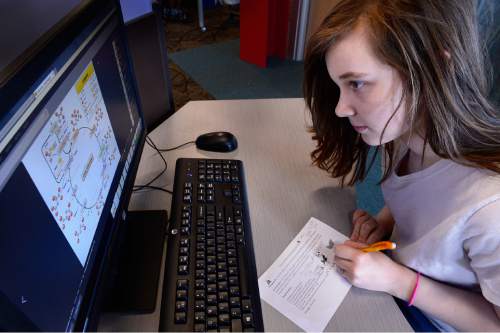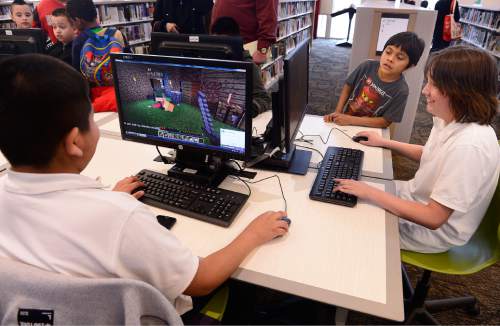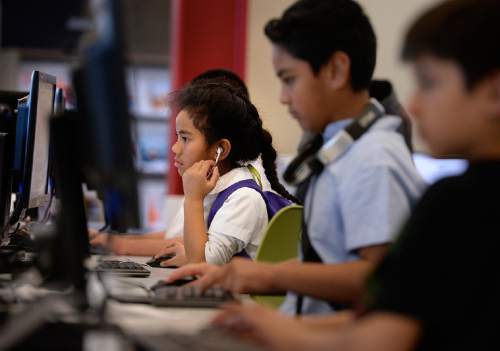This is an archived article that was published on sltrib.com in 2015, and information in the article may be outdated. It is provided only for personal research purposes and may not be reprinted.
Salt Lake City is one step closer to enticing Google Fiber to build a high-speed computer network here that would deliver 1 gigabit per second speeds to households and, perhaps, small businesses.
Mayor Ralph Becker has welcomed Google Fiber because, he believes, such a network would accelerate business development — particularly home-based businesses — while attracting investment and creating new opportunities.
But would a Google Fiber network bridge the digital divide that plagues under-served neighborhoods and low-income Salt Lakers and their children?
It won't if Kansas City — where Google is now building out a fiber network — is any indicator.
The connectivity divide is a reality throughout the country. Low-income urban or rural Americans without access to high-speed Internet simply don't have the opportunities enjoyed by those who have broadband choices.
Recently, with little fanfare, two items passed across the Salt Lake City Council's dais that touch on the growing phenomenon.
One is a franchise agreement the council passed in its continuing effort to lure Google Fiber to the capital city. The second is a citywide Consolidated Housing Plan that sets out strategies to create "neighborhoods of opportunity."
Both contemplate "bridging the digital divide" for residents and businesses that don't have high-speed Internet. In many low-income households, there is no Internet at all.
Fourteen-year-old Devin Wilson, who lives in Glendale, doesn't have a computer at home. So, every day after school he hits the Glendale Branch of the Salt Lake City Library to use one of its 36 public computers.
"I like to play games and do homework," he said.
Another Glendale Middle School student, Faith Noel, said her parents have a computer that is old and slow. She, too, uses the high-speed Internet at the Glendale Library, where she studies such things as photosynthesis and watches YouTube.
Councilman Kyle LaMalfa, whose west-side District 2 encompasses Glendale and Poplar Grove, said the area is under-served when it comes to broadband.
"Today, you can buy download speeds on the east side that are 100 times faster than on the west side," he said. "And the upload speed is 1,000 times faster on the east side."
That is true in some east-side neighborhoods, but service varies from central city to the east bench.
Broadband isn't the only thing wanting in LaMalfa's district. According to a study by University of Utah business researcher James Wood, Glendale and Poplar Grove lack many opportunities in such things as education, jobs, business opportunity and transportation.
The neighborhoods scored 1 to 2 on the "opportunity index" where 10 is the highest score.
Google Fiber's model for its network build-out doesn't guarantee it will come to low-income neighborhoods, LaMalfa said. He fears that if connectivity is not improved in his district, youngsters growing up there now will be disadvantaged in the future.
—
Market responds • Google Fiber purchased iProvo, the city's troubled fiber network, and began operations there in January 2014. But Kansas City was the first municipality to get a start-from-scratch Google Fiber network. Although that build-out is ongoing, Google Fiber's impact on the broadband market already has been felt. Competitors in Kansas City have increased their broadband speeds and lowered prices, according to National Public Radio.
When Google announced that it would be coming to Austin, Texas, competitors, such as AT&T, boosted speeds and dropped prices even though Google hasn't yet broken ground, according to an NPR report. AT&T said it, too, would create a 1 gigabit-per-second network.
In Utah, CenturyLink has announced plans for a 1 gigabit service in unincorporated Salt Lake County and in South Jordan's Daybreak community for $80 per month.
Google's 1 gigabit Internet service is $70 per month in Kansas City, Austin and Provo. With a TV package in those cities, the monthly fee is $130.
Google Fiber offers a free slower-speed Internet service for seven years with the price of hookup — $300.
It also provides small business connections in those cities.
It remains unclear whether the small-business service would be offered if the company were to come to Salt Lake City, said Google spokeswoman Kelly Mason.
Google's build-out model is to provide service in neighborhoods that demonstrate demand by the number of households that sign up before cable installation. The percentage of sign-ups necessary varies depending on the density of the area.
—
Low-income challenges • In Kansas City, Google is not reaching most low-income neighborhoods because demand is not there, said Michael Liimatta of Connecting for Good, a Kansas City nonprofit that seeks to bring the Internet to low-income households.
Although the $300 hookup fee may be paid in $25 installments over 12 months, it only can be purchased by property owners — not renters.
"That's a challenge for low-income families, many of whom rent," Liimatta said. "We are trying to fill in the gaps that Google has left."
According to a survey commissioned by The Wall Street Journal, only 15 percent of households in Kansas City's low-income neighborhoods opted for Google's free service with $300 hookup fee. By contrast, more than 50 percent of households in upper-income neighborhoods signed up for the 1 gigabit package.
Councilwoman Erin Mendenhall said she doesn't believe the digital divide will be bridged in Salt Lake City until the municipality takes on some of the burden to ensure all households are served.
"The city needs to champion digital equality," she said. "I don't see a way to reach all our residents without the city helping with the buildout [of various networks]."
Mendenhall added that the Internet is now a necessity for all Americans. "Fiber is not just about entertainment," she said. "It's about access to education, health care and business."
In Kansas City, Liimatta found that many low-income Kansas City residents don't need 1 gigabit service. What they do require are computers, knowledge and an Internet provider.
Connecting for Good buys used laptops and refurbishes them, teaches classes for beginners in how to use the Internet, and provides a wireless service — all at low cost.
Last year, Google Fiber awarded Connecting for Good a $25,000 grant.
"Google didn't cause the digital divide," Liimatta said. "And it won't close it."
What is clear is that the digital future is here. But the question remains, is it a future for everyone?







